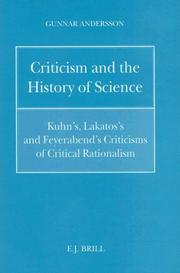| Listing 1 - 10 of 44 | << page >> |
Sort by
|

ISBN: 9027715750 9027719535 9400962541 9789027715753 Year: 1984 Volume: 79 Publisher: Dordrecht
Abstract | Keywords | Export | Availability | Bookmark
 Loading...
Loading...Choose an application
- Reference Manager
- EndNote
- RefWorks (Direct export to RefWorks)
Political sociology --- Science --- Rationalism --- Philosophy --- Social aspects --- Radnitzky, Gerard --- -Science --- -Natural science --- Science of science --- Sciences --- Knowledge, Theory of --- Religion --- Belief and doubt --- Deism --- Free thought --- Realism --- Rationalism. --- Philosophy. --- Social aspects. --- -Philosophy --- Science and society --- Sociology of science --- Normal science --- Philosophy of science --- Radnitzky, Gerard. --- Wetenschap. Sociale aspecten. --- Sciences. Philosophie. --- Sciences. Aspects sociaux. --- Wetenschap. Filosofie. --- Science - Philosophy --- Science - Social aspects
Book
Year: 1975 Publisher: Göteborg : Universitet,
Abstract | Keywords | Export | Availability | Bookmark
 Loading...
Loading...Choose an application
- Reference Manager
- EndNote
- RefWorks (Direct export to RefWorks)
Science --- Technology --- Sciences --- Technologie --- Social aspects. --- Social aspects --- Aspect social --- Aspect social

ISBN: 9004100504 Year: 1994 Publisher: Leiden Brill
Abstract | Keywords | Export | Availability | Bookmark
 Loading...
Loading...Choose an application
- Reference Manager
- EndNote
- RefWorks (Direct export to RefWorks)
Rationalism --- Science --- Skepticism --- Philosophy --- Feyerabend, Paul --- Kuhn, Thomas S. --- Lakatos, Imre.
Book
Year: 1890 Publisher: Stockholm Norstedt
Abstract | Keywords | Export | Availability | Bookmark
 Loading...
Loading...Choose an application
- Reference Manager
- EndNote
- RefWorks (Direct export to RefWorks)

ISBN: 3169453084 Year: 1988 Publisher: Tübingen Mohr Siebeck
Abstract | Keywords | Export | Availability | Bookmark
 Loading...
Loading...Choose an application
- Reference Manager
- EndNote
- RefWorks (Direct export to RefWorks)
Rationalism --- Science --- Skepticism --- Philosophy --- Feyerabend, Paul --- Kuhn, Thomas S. --- Lakatos, Imre.
Book
Year: 1893 Publisher: Stockholm Norstedt
Abstract | Keywords | Export | Availability | Bookmark
 Loading...
Loading...Choose an application
- Reference Manager
- EndNote
- RefWorks (Direct export to RefWorks)
Book
Year: 1910 Publisher: Stockholm Centraltryckeriet
Abstract | Keywords | Export | Availability | Bookmark
 Loading...
Loading...Choose an application
- Reference Manager
- EndNote
- RefWorks (Direct export to RefWorks)
Book
Year: 1908 Publisher: Uppsala Nya Tidnings A. B. 's Tr
Abstract | Keywords | Export | Availability | Bookmark
 Loading...
Loading...Choose an application
- Reference Manager
- EndNote
- RefWorks (Direct export to RefWorks)
Book
Year: 2003 Publisher: Max Planck Institute for Demographic Research
Abstract | Keywords | Export | Availability | Bookmark
 Loading...
Loading...Choose an application
- Reference Manager
- EndNote
- RefWorks (Direct export to RefWorks)
In this paper, we present a number of descriptive measures of couples experience of union dissolution in a wide range of European countries. We use data from the last round of Fertility and Family Surveys in order to get a broad cross-country comparison of levels and basic patterns of union disruption in countries considered. We use corresponding data from the USA in order to find out to what extent patterns in Europe differ from those at the other side of the Atlantic. With a number of lifetable estimations we display levels of union dissolution of couples in different types of unions. Evidently, the picture looks different if one follows marriages from the date of marriage formation than if one follows any union from the date when a couple moves together. In addition, the stability of unions that start as cohabitation differs from the stability of unions that begin with a direct marriage. Our presentation reveals that unions in all European countries are much more stable than unions in the US. The latter country stands out as an extreme case no matter what type of union we choose to study. Nevertheless, a high degree of variation also exists within Europe; a number of Catholic countries in Southern and Eastern Europe impress with particularly low levels of union dissolution.
Book
Year: 1897 Publisher: Stockholm Norstedt
Abstract | Keywords | Export | Availability | Bookmark
 Loading...
Loading...Choose an application
- Reference Manager
- EndNote
- RefWorks (Direct export to RefWorks)
| Listing 1 - 10 of 44 | << page >> |
Sort by
|

 Search
Search Feedback
Feedback About UniCat
About UniCat  Help
Help News
News